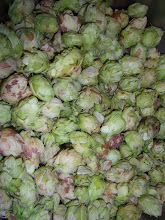 getting to it now. Nothing like adult obligations to put your life into perspective. Anyway, I am declaring this my Spring saisonal, the second saisonal of the year and the fourth beer in the ever-growing Great Saison Chain of Being. That beer does look a bit creepy in the carboy, doesn’t it?
getting to it now. Nothing like adult obligations to put your life into perspective. Anyway, I am declaring this my Spring saisonal, the second saisonal of the year and the fourth beer in the ever-growing Great Saison Chain of Being. That beer does look a bit creepy in the carboy, doesn’t it? 173. Hibiscus Saison
Mash:
3 lbs. Dingemanns Pilsner
3 lbs. Best Malz Spelt
2 ¼ lbs MFB Pilsner
1 lb. Weyermann Acidulated
½ lb. flaked barley
Mash @ 151° F for 80 minutes w/ 3 gallons RO water & 5 g. gypsum; collected 1 ½ gallons @ 1.072
Batch sparge @ 168° F for 20 minutes w/ 4 gallons RO water & 5 g. gypsum; collected 4 gallons @ 1.024
Collected 5 ½ gallons; topped off to 6 ¾ gallons, brought to a boil (70 minutes), & added:
w/60 to go: 1 ½ oz. Willamette leaf 7.8% AA
w/15 to go: 1 oz. Styrian Golding pellet 2.0% AA
w/10 to go: 3 g. Wyeast yeast nutrient
½ lb. table sugar
w/0 to go: Styrian Golding pellet 2.0% AA
2.5 oz. hibiscus leaves
Let sit for 20 minutes; chilled and racked onto Yeast Bay Wallonian Farmhouse from 172. Saison
Primary: 3/17/2014 @ 72° F
Secondary:
4/12/2014 @ 1.004
Bottled:
6/2/2014 w/ 4 oz. table sugar
OG:
1.044
FG:
1.004
 although the hibiscus does cover over some of the burnt phenolics I get from
the yeast in the other beer with this yeast. The beer pours a dirty pink, with
a voluminous, long-lasting head that carries a slight pink hint. The nose is
floral with a slight fruit tartness—I’d call it hibiscus, but that is a bit
obvious—and some slight creaminess backed with pepper. The beer is bright and
tart on the tongue—from both the hibiscus and the acidulated malt—with just a
hint of body after the crisp bite from the carbonation. Flavors open with a
floral fruitiness that is slightly cherry, and transition into pepper and dry
cracker. The finish is rustic and a bit uneven—it is slightly scratchy via the
carbonation, and not as clean as it needs to be, although there is a bit of
lingering hibiscus sourness that makes up for it. There are some flavor
components in the final third that I can’t quite put my finger on—a slight
burnt flavor mixed with what I’ll labeling the intangible yeast elements—that
make me label this beer pedestrian. The hibiscus components are solid; I’ll
certainly revisit that part of this beer, as well as the grain bill. I’m just
going to find another yeast to try, and maybe add something small like a couple
grams of grains of paradise at flameout with the last hop addition. So close to
wonderful, but missing that element that brings it all together. Stupid
Wallonian Farmhouse.
although the hibiscus does cover over some of the burnt phenolics I get from
the yeast in the other beer with this yeast. The beer pours a dirty pink, with
a voluminous, long-lasting head that carries a slight pink hint. The nose is
floral with a slight fruit tartness—I’d call it hibiscus, but that is a bit
obvious—and some slight creaminess backed with pepper. The beer is bright and
tart on the tongue—from both the hibiscus and the acidulated malt—with just a
hint of body after the crisp bite from the carbonation. Flavors open with a
floral fruitiness that is slightly cherry, and transition into pepper and dry
cracker. The finish is rustic and a bit uneven—it is slightly scratchy via the
carbonation, and not as clean as it needs to be, although there is a bit of
lingering hibiscus sourness that makes up for it. There are some flavor
components in the final third that I can’t quite put my finger on—a slight
burnt flavor mixed with what I’ll labeling the intangible yeast elements—that
make me label this beer pedestrian. The hibiscus components are solid; I’ll
certainly revisit that part of this beer, as well as the grain bill. I’m just
going to find another yeast to try, and maybe add something small like a couple
grams of grains of paradise at flameout with the last hop addition. So close to
wonderful, but missing that element that brings it all together. Stupid
Wallonian Farmhouse.

No comments:
Post a Comment